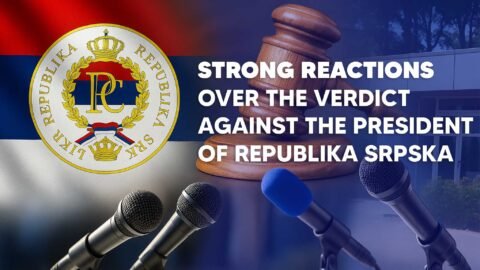The President of the Organization of Veterans of the Army of Republika Srpska, Slobodan Župljanin, stated that the Dayton Peace Agreement has been significantly undermined today but still ensures peace and development for Republika Srpska through persistence.
“Calls for war and constant threats coming from the Federation of Bosnia and Herzegovina and international actors will ultimately contribute most to the final dissolution of Bosnia and Herzegovina,” Župljanin told SRNA.
Župljanin emphasized that Republika Srpska and the Serb people can only accept a Bosnia and Herzegovina as agreed upon in the Dayton Peace Agreement, with its original competencies and powers intact. He added that all other unilateral variations are unacceptable and can only accelerate the disintegration of Bosnia and Herzegovina.
“After all these years, it is time for all relevant factors, both in Bosnia and Herzegovina and internationally, to understand that Bosnia and Herzegovina can only function through constructive democratic dialogue between two entities and three constituent peoples in conditions of peace and stability. Without the will of the Serbian people, Bosnia and Herzegovina cannot exist,” Župljanin warned.
He noted that the Dayton Peace Agreement marked the end of a bloody civil war in Bosnia and Herzegovina, underscoring that this international treaty has maintained peace for nearly three decades since its signing.
“None of the warring parties achieved their maximalist demands or expectations. All sides made concessions under pressure from international negotiators. At the time, Bosnia and Herzegovina abandoned its demands for a centralized unitary Muslim state,” Župljanin recalled.
According to him, Republika Srpska and the Serb people gave up on an independent Serb state, and Croatian representatives made similar concessions, leading to the creation of a Dayton-based Bosnia and Herzegovina with a clearly defined internal structure and the responsibilities of its levels of government.
“The Serb people accepted Republika Srpska with its clearly defined competencies, which effectively established it as a state for the Serb people—with a defined territory, population, borders, armed forces, constitution, and financial system,” Župljanin noted.
He pointed out that Serbs also accepted other elements that define statehood, such as special parallel relations with other states, territorial integrity, sovereignty, and shared ownership of the Brčko District, as well as certain competencies in foreign policy.
According to Župljanin, while this arrangement did not meet all Serbian demands, it provided a high degree of autonomy and independence within the framework of the Dayton Bosnia and Herzegovina.
“The other two sides agreed to this arrangement, primarily because they could not achieve a military victory over the Army of Republika Srpska, even with NATO support. If they had succeeded militarily, there would have been no Dayton Agreement, and the Muslims would have achieved a state aligned with their interests through war,” Župljanin explained.
Župljanin concluded that, unfortunately, immediately after the signing of the Dayton Peace Agreement, the Muslim side, with comprehensive support from international actors, began dismantling the agreement through the use of force and threats of force.
November 21 marks 29 years since the signing of the General Framework Agreement for Peace in Bosnia and Herzegovina and its 12 annexes, which ended the war in Bosnia and Herzegovina and established its constitutional and legal order.
This agreement created the state community of Bosnia and Herzegovina, consisting of two entities, Republika Srpska and the Federation of Bosnia and Herzegovina, which are signatories to all annexes.
The Dayton Agreement was formally signed on December 14, 1995, at the Élysée Palace in Paris.
Source: RTRS









